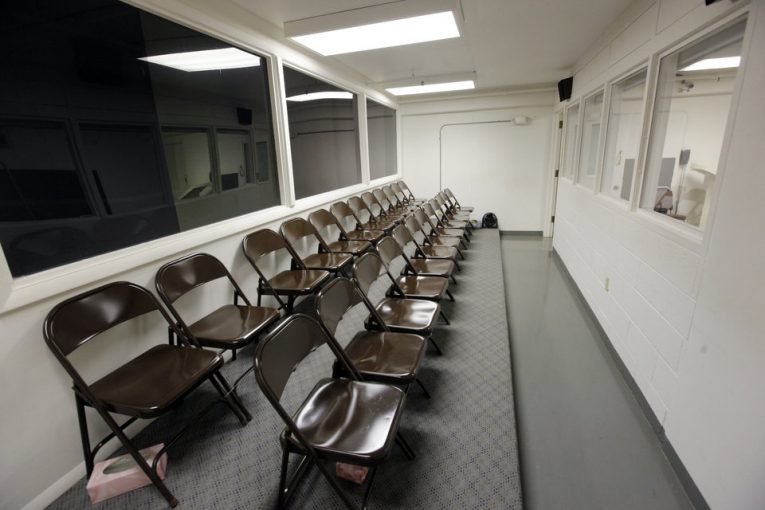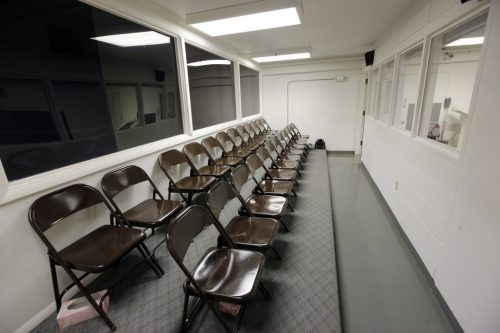

By Leila Katibah & Wayne Chan
OKLAHOMA CITY – “Mercilessly executing a man this disabled would be an inhumane spectacle beneath our individual and collective dignity,” argued Assistant Federal Public Defenders Thomas Hird and Katrina Conrad-Legler, in their petition for clemency regarding the case of Benjamin Cole Friday.
The attorneys for Cole, an Oklahoma death row prisoner set to be executed Oct. 20, about a month away, filed a petition for clemency while waiting for a Pittsburgh County judge’s determination on a competency order.
The competency hearing is set for Sept. 30, although the clemency hearing is set earlier, on Sept. 27.
The clemency petition describes Cole as “a frail, 57-year-old man with a damaged and deteriorating brain, suffering from progressive and severe mental illness who poses no threat to anyone,” if he were to serve a life sentence without parole.
In April, Cole’s attorneys and psychologist Dr. David G. Hough attempted to assess his mental condition, and found him uncommunicative, sitting in a wheelchair in a dark prison cell.
With the help of a flashlight, Dr. Hough discovered, according to the clemency petition, “Mr. Cole was wearing a thick towel or turban-like article of clothing wrapped around his forehead which covered his eyes.”
And, said the doctor, Cole slowly moved from the wheelchair to the toilet, “with his head slumped to the left side while his right hand remained resting against the right side of his head.”
Prison staff stated he had not uttered a single word for months.
His defense said Cole was unable to communicate with his attorneys and Dr. Hough during the assessment, likely as a result of being isolated on death row, in solitary confinement for years, unable to speak to anyone.
Lawyers said Cole is mostly catatonic, with a growing lesion on his brain in a region associated with paranoid schizophrenia. He displays symptoms of Parkinson’s disease and has brain damage from several major head injuries during childhood and early adulthood.
Tom Hird, an attorney of Cole, said, “Benjamin Cole suffers from paranoid schizophrenia and brain damage that leave him with no rational understanding of why the State seeks to execute him. His mental health has deteriorated dramatically over his years in solitary confinement, and he is now so physically compromised that he can barely move. He is not a threat to anyone, and his execution would be both unconstitutional and unconscionable.”
The petition explains that if it were not for Cole’s mental illness, he never would have been on death row. In the original trial, Cole was offered a plea deal in exchange for life without parole.
Although, notes the petition, Cole confessed to killing his daughter and expressed incredible remorse, he rejected the plea deal due to his extreme religious delusions.
The petition also details the trauma Cole experienced throughout his childhood, remarking both of his parents were addicts. His mother abused drugs and alcohol while pregnant with him. Family members introduced and encouraged drug and alcohol abuse from a young age.
The petition claims Cole was sexually abused by adult family members and family friends and witnessed similar abuses perpetrated by his father to his siblings. He was also physically abused by his stepfather who would beat him with a bullwhip.
In line with his family’s medical history, Cole began to develop schizophrenia in his early 20’s and was not correctly diagnosed until 2008, stated the filing, adding that by the time of his crime, due to his crippling mental illness, he was intermittently homeless and was unable to maintain stable work.
His attorneys sought to postpone his clemency proceedings until after Sept. 30 so that the Pittsburg County District Court could finalize its decision on whether to order a competency trial.
The Board of Pardons and Parole, however, denied the request, so Cole’s hearing will be held on Sept. 27.
Due to his mental and physical ailments, the petition asks the Board and the Governor to grant him clemency and commute his sentence to life without parole.




